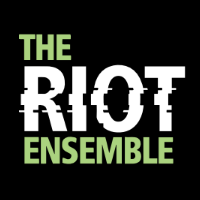A few moments with Mirela Ivičević
On Saturday, we will be at St Nicholas’ Church in Brighton, giving the world premiere of Baby Magnify/Lilith’s New Toy by the Croatian composer Mirela Ivičević, one of our 2017 call for scores commissions. (Also on the programme: another call for scores commission by Sylvain Marty.) This week Mirela took some time out of her busy travelling schedule to answer a few questions from us about her work.
Tim Rutherford-Johnson: Hi Mirela – thank you for speaking to us! Your piece Baby Magnify/Lilith’s New Toy has a really intriguing title that raises a lot of questions. To start us off, can you tell us what it means?
Mirela Ivičević: Thank you! The piece follows the contours of the Magnum Opus, the alchemical process of working with starting material to create the so-called philosopher’s stone, which according to Carl Jung corresponds to the transformative process of the psyche.
Originally, the Magnum Opus had four main stages: nigredo or blackening, a phase of chaos, shadow, of ‘massa confusa’; albedo or whitening, washing away of impurities; citrinitas or yellowing, ‘transmutation of silver into gold’, or symbolically, accumulation of wisdom based on previous experience; and finally rubedo or reddening, the wholeness, the phase in which the material (or a person) achieves their maximum potential. I believe these stages will be pretty identifiable in the piece.
It’s a ‘baby’ because it’s only about eight minutes long and because it is my first ensemble piece exploiting this concept consciously.
And the Lilith archetype is always around my pieces as a hidden narrative. Her seemingly frightening and uncompromising character and undisputable power comes closest to the energy of those strong women creators I am happy to see more and more in field of composition nowadays. In this piece Lilith is a baby, playing somewhat carelessly yet curiously with raw material to make sonic magic.
TR-J: Previous pieces of yours have confronted big themes. Sometimes in quite an ironic fashion, as in your musical heritage in Phantom no. 3 and the problem of CVs and musical biographies in Orgy of References. In others, you address more serious issues of diversity, co-existence and violent oppression. Can we expect anything similar in Baby Magnify/Lilith’s New Toy?
MI: Actually, Baby Magnify is one of a few pieces of mine whose direct background is of a non-political, ‘timeless’ nature. The way the composition is structured on a macro and even more on micro level I think still shows my ongoing fascination with trying to find a way for diversities to creatively coexist in a shared space. This is always a conscious, politically inspired choice, although it is probably rooted in my subconsciousness as well, being raised a multicultural family in a multicultural patchwork country. It also simply feels right.
TR-J: You were born in Croatia but now you live in Vienna. When did you move to Austria, and what encouraged you to move?
MI: I live kind of nomadically at the moment, mostly between my hometown of Split, Zagreb and Vienna, which I guess is not unusual for a musician nowadays. I moved to Vienna originally because I wanted to broaden my knowledge in electroacoustics as well as in composing for various media, as well as simply to move and experience the world from another point of view. It’s something which I’d recommend to any artist, there’s nothing more crucial and more rewarding then setting yourself into unknown, physically or metaphorically.
Vienna is an inspiring place and still one of the most artists-friendly cities in Europe. And it’s also reasonably close to the Mediterranean, without whom I wouldn’t want to live!
TR-J: In your biography you mention that your music makes use of the ‘side-products of media-dominated reality’. Can you explain what you mean by this? Will we hear any of these elements in your Riot commission?
MI: It means that rather then escaping the everyday sounds I get exposed to through various media, I use them as my starting material. I said ‘side-products’ as a polite alternative to trash. They are not always trash: some I find valuable as they are, but often I also use sounds I don’t value or whose original context or source affects me negatively. Sometimes I work deliberately with the sounds and their respective contexts, and such pieces are more theatrical. Sometimes though, as in case of Riot commission where I used, among other things, various human breathing gestures, I exploit them more hermetically: they are just a source of basic material from which to create something contextually independent.
TR-J: Your music is full of exciting and original sounds. How do you discover them? Do you experiment with the instruments, talk to players, or collect them from other pieces you’ve heard?
MI: I enjoy getting my hands ‘dirty’, so I have a bunch of different instruments I bought cheap on the flea-market. It is also a huge advantage that I’m a part of Black Page Orchestra, with absolutely amazing, adventurous musician friends with whom to discuss any idea I might have.
Ideally, I love writing not for mere instruments, but for musicians’ personalities. Working closely with a fellow musician, getting to know their character, preferences and even hidden talents opens so many additional possibilities, makes me more adventurous in terms of trying out new things and usually produces my best works.
But then again, sometimes it happens that you compose for people you haven’t yet met, and they sweep you off your feet with the magic they do with your score. Like a soulmate you first meet on Facebook.
TR-J: Now that you’ve finished this piece for us, what is next on your agenda?
MI: I’m currently working on an electronic solo set for a November festival of experimental music Sine Linea in Greta Gallery in Zagreb, a new piece for piano, electronics and video for pianist Alfredo Ovalles, and a theatre piece for children commissioned by the Jeunesse Austria to be premiered at the Mozarthaus in Vienna in April. The last one I am especially looking forward to because it approaches the youngest audience while dealing with a very sensitive, very personal and – unfortunately for a lot of kids – very current theme of exile and trying to find a place for oneself in a new, foreign land.
Another project coming up that I’m very excited about is new piece for percussion and solar panels. Friends of mine, the Croatian artists’ duo Lightune.G discovered a way to translate light into sound using solar panels – what they call luminoacoustics. I’ve already tried it out in a piece I made for them and percussionist Kaja Farszky last year, and it was an amazing experience that I can’t wait to continue. After that a new piece for Black Page Orchestra and music for Peter Tscherkassky’s experimental movie Dreamwork with Ensemble Nikel.
TR-J: Finally, if you could choose anything, what would be your dream line-up of instruments and/or voices to write for? And where would you like the premiere of this fantasy piece to take place?
MI: I love diversity, I love depths, I love noise, and I love bringing together extremes, so I guess it would be an ensemble of lots of different bass and soprano instruments, electronics, solar panels, probably also a skilful soprano/actress for some word play. And the dream venue for the premiere: definitely the abandoned submarine port from the Yugoslav era in Rogačić bay on the island Vis, one of the places I like to call home. At night, with the audience listening from boats on the sea. But of course, this is just a dreamy frame: what’s always more important is what a composer would fill this frame with.
TR-J: Sounds like a beautiful concept! Maybe one day … Until then, we look forward to playing Baby Magnify/Lilith’s New Toy in Brighton. Thank you, Mirela.


